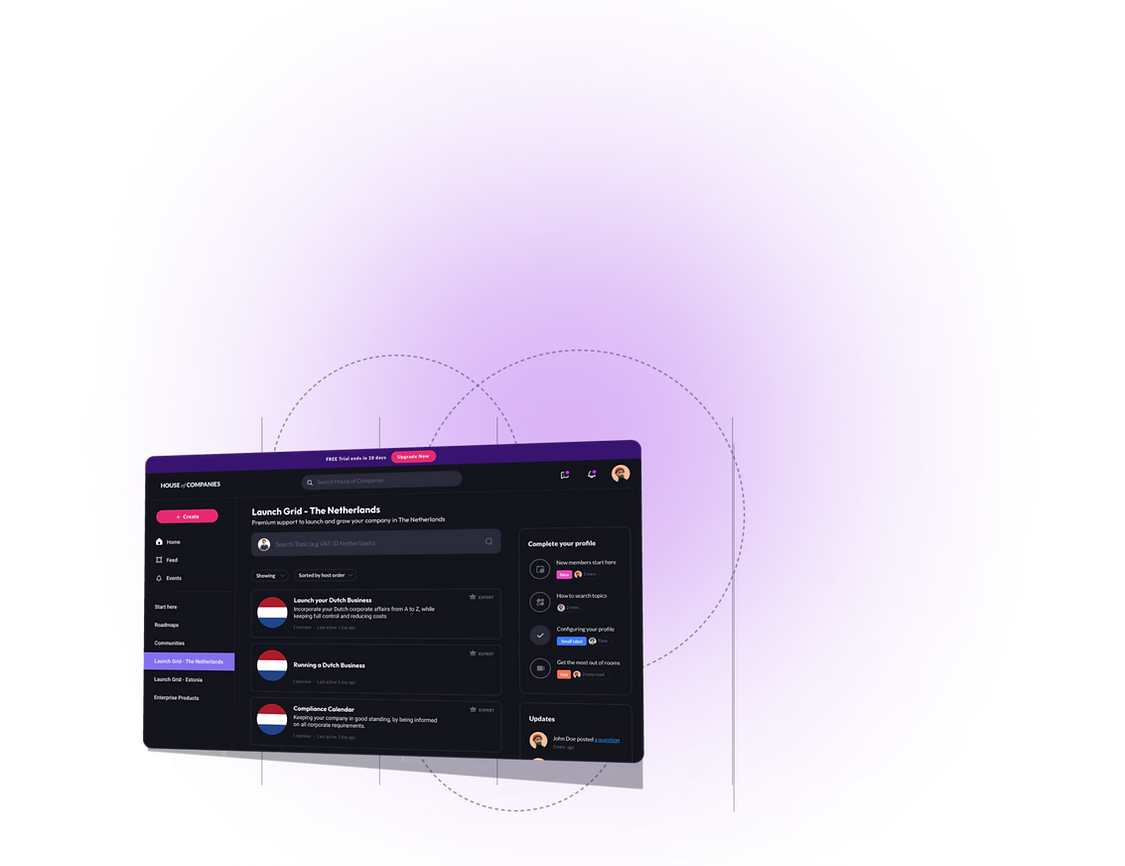Our comprehensive Entity Management Services span across global markets, with a special emphasis on supporting businesses in non-EU countries. The Netherlands serves as our central hub, providing an optimal gateway for organizations looking to manage their international operations.
Whether it's compliance, governance, or corporate restructuring, our expert team facilitates smooth integration into the Dutch market while ensuring all global obligations are met. We handle the complexities of managing legal entities, from the incorporation process to ongoing reporting, with a focus on helping your business thrive across borders.
Looking to relocate your team to the Netherlands? Our Relocate Staff to the Netherlands service simplifies the entire process for your business. From handling work permits to ensuring compliance with Dutch immigration laws, we manage all the necessary steps so that your employees can make the transition smoothly.
As part of our entity business customer services in the Netherlands, we provide complete support, ensuring a hassle-free relocation that positions your company for success in the European market.

The ICT (Intra-Corporate Transfer) Permit allows businesses to transfer key employees within the same international group from non-EU countries to the Netherlands. This permit is essential for businesses aiming to relocate highly skilled personnel such as managers, specialists, or trainees. To qualify for the ICT permit, the staff member must have been employed within the company for at least three months before the transfer, and the transfer must be temporary, typically lasting no longer than three years.
The process includes securing proof of intra-company employment, meeting salary thresholds, and ensuring that the position fulfills the necessary skill requirements. Our team simplifies this process, handling documentation, compliance with Dutch immigration laws, and ensuring that the permit application is completed accurately. The ICT permit offers a streamlined way to ensure that businesses can bring their global talent into the Netherlands efficiently and legally.
If you need more details or further adjustments, feel free to ask!
Relocating or employing Highly Skilled Migrants in the Netherlands involves several key steps that ensure compliance with Dutch immigration policies and labor laws. The Netherlands offers an attractive framework for companies looking to hire highly qualified professionals from abroad, through the Highly Skilled Migrant Program. To qualify, employers must be recognized sponsors by the Dutch Immigration and Naturalisation Service (IND), and the migrant must meet specific income requirements.
The process includes applying for a residence permit, which typically takes around two to four weeks. This permit allows highly skilled workers to live and work in the Netherlands. Additionally, the 30% tax ruling may offer significant financial benefits, providing an exemption on a portion of the employee's taxable income.
Employing highly skilled migrants can provide businesses with a competitive advantage, helping you access top talent and drive innovation. Our team ensures a smooth relocation process, handling all the paperwork, immigration details, and compliance checks as part of our customer services for entity businesses in the Netherlands.
The European Blue Card is a specialized work permit designed to attract highly skilled professionals from non-EU countries to live and work in the Netherlands and across Europe. It provides a streamlined process for both employees and employers, offering numerous benefits, including greater flexibility and mobility within the EU.
The Blue Card allows non-EU nationals to work and reside in the Netherlands for the duration of their employment contract, typically for up to four years.
After 18 months of holding a Blue Card in the Netherlands, employees can move to another EU country and apply for a Blue Card there.
Holders of the Blue Card may qualify for permanent residency in the Netherlands after 5 years of continuous legal residence in the EU.
Family members of Blue Card holders are eligible to join them in the Netherlands and can also work without restrictions.
Applicants must have a valid employment contract with a Dutch company, offering work for at least 12 months.
The gross annual salary must meet the Dutch government's minimum threshold for highly skilled workers, which is adjusted annually.
Applicants must hold a recognized higher education qualification, such as a bachelor’s or master’s degree. In some cases, significant professional experience may also qualify.
Blue Card applicants must have health insurance coverage as required under Dutch law.

Job Offer: The first step is securing a job with a company in the Netherlands that is willing to sponsor the Blue Card.
Employer Application: Employers apply for the Blue Card on behalf of the employee, providing all necessary documentation such as the contract, proof of qualifications, and a valid work permit.


Processing Time: The Blue Card application is typically processed within 90 days, although this can vary.
Residence Permit: Once approved, the employee can apply for a residence permit that allows them to work and live in the Netherlands.

Starting the residency application process in the Netherlands involves a series of well-defined steps governed by Dutch immigration law. Whether you are applying as a skilled professional, entrepreneur, investor, or for family reunification, here’s a basic guide to help you understand the process:
Determine Your Eligibility
The first step is to identify the appropriate type of residency permit based on your purpose of stay. Common categories include work, entrepreneurship, study, or family reunification. Dutch law offers specialized residency options for highly skilled migrants, entrepreneurs, and investors.
Gather Required Documentation
The application process requires specific documentation. This usually includes your passport, proof of employment or business activities, proof of sufficient financial means, and sometimes health insurance. For entrepreneurs and investors, additional documentation regarding your business plan and investment capital will be required.
Submit Your Application to IND
The Immigration and Naturalization Service (IND) is the authority that processes residency applications in the Netherlands. You can submit your application online or through the Dutch embassy or consulate in your home country. Be sure to provide accurate and complete information to avoid delays.
Application Fee
A non-refundable fee must be paid when submitting your residency application. The amount depends on the type of permit you are applying for. The IND will provide specific instructions on how to pay this fee.
Wait for Processing
After submitting your application, the IND will review it, and processing times vary based on the type of permit. Typically, it can take several weeks to a few months. If additional documentation is needed, the IND will notify you.
Receive Your Decision
If your application is approved, you will receive a letter of approval and instructions on how to collect your residency permit. If it is denied, you will have the opportunity to appeal the decision.
Navigating the complexities of residency applications and immigration law can be challenging, especially for businesses and individuals expanding into the Dutch market. Our Entity Management Services offer the opportunity to obtain a legal consult specifically tailored to address your residency questions.
During this consult, our experienced legal advisors will:
Assess Your Situation
We begin by understanding your unique circumstances and objectives—whether you are an entrepreneur, investor, or skilled professional. This personalized approach allows us to provide targeted advice that aligns with your goals.
Clarify Residency Options
The Netherlands offers various residency pathways, including the Dutch Entrepreneur Visa, Highly Skilled Migrant Permit, and European Blue Card. Our legal experts will explain the eligibility criteria, application procedures, and benefits of each option to help you make informed decisions.
Provide Documentation Guidance
Gathering the correct documentation is crucial for a successful application. Our consultants will provide a comprehensive checklist of required documents and assist you in ensuring everything is in order.
Discuss Compliance and Obligations
Understanding your rights and responsibilities under Dutch immigration law is essential. We will outline the legal obligations you must meet during your residency, including tax implications and renewals.
Answer Your Questions
We encourage an open dialogue during the consult. Feel free to ask any specific questions or raise concerns regarding your residency plans, and our team will provide clear and actionable answers.
By obtaining a legal consult with us, you equip yourself with the knowledge and confidence needed to navigate the residency process effectively. Our aim is to facilitate your smooth transition into the Netherlands while ensuring compliance with local regulations.
Feel welcome, and try out our solutions and community,
to bring your business a step closer
to international expansion.

Got questions?
Lets talk about your options
Stay updated with the latest news and exclusive offers. Subscribe to our newsletter for regular insights delivered to your inbox!